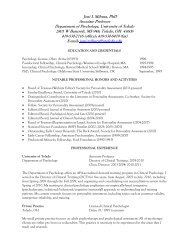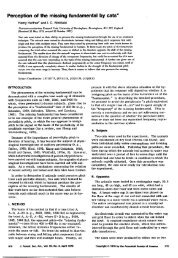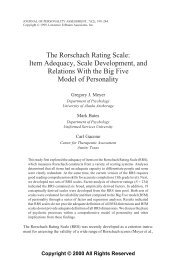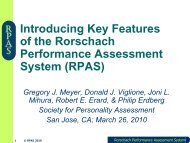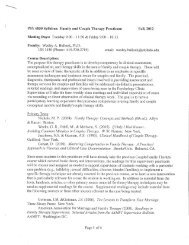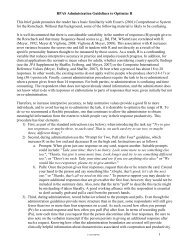Message from the Editor Inside This Issue A Tribute to Dr. Alice ...
Message from the Editor Inside This Issue A Tribute to Dr. Alice ...
Message from the Editor Inside This Issue A Tribute to Dr. Alice ...
Create successful ePaper yourself
Turn your PDF publications into a flip-book with our unique Google optimized e-Paper software.
Volume 1, Number 2 • Spring 2012<br />
Lab Gab: The Social and Affect Lab<br />
How long can you stick your hand in a bucket of ice water? If you<br />
are like most people, probably not very long. After a while, <strong>the</strong> pain<br />
becomes <strong>to</strong>o much <strong>to</strong> bear. Research in <strong>the</strong> social and affect lab, led<br />
by <strong>Dr</strong>. Andy Geers, centers on <strong>the</strong> variety of fac<strong>to</strong>rs contributing <strong>to</strong><br />
how individuals identify and process (un)pleasant information (like <strong>the</strong><br />
pain experienced <strong>from</strong> exposure <strong>to</strong> cold water) and <strong>the</strong> effects of such<br />
processing and identification for subsequent behavior and decisionmaking.<br />
Specifically, efforts have focused on two primary lines of<br />
research. The first regards optimistic and pessimistic expectancies and<br />
<strong>the</strong>ir relation <strong>to</strong> particular outcomes such as decision-making and goal<br />
pursuit. The second involves <strong>the</strong> manner in which attitudes, choice and<br />
expectations shape treatment decisions, symp<strong>to</strong>m perception and health<br />
outcomes.<br />
It is this latter line of research, which is proving <strong>to</strong> be particularly<br />
fruitful for <strong>the</strong> lab. In 2006, <strong>Dr</strong>. Geers and his lab were awarded a<br />
research grant <strong>from</strong> <strong>the</strong> National Institute for Neurological Disorders<br />
and Strokes (NINDS). With this funding, <strong>the</strong> lab examined how<br />
expectations for pain relief, as well as <strong>the</strong> desire for pain relief, alters<br />
<strong>the</strong> perception of a painful stimulus. Three graduate students — Justin<br />
Wellman, Stephanie Fowler and Hea<strong>the</strong>r Rasinski — along with a<br />
wonderful team of undergraduate research assistants were key in seeing<br />
this project through. The grant project has recently come <strong>to</strong> an end<br />
and has already resulted in several important findings regarding <strong>the</strong><br />
psychological processes responsible for pain relief. It is in such findings<br />
that <strong>the</strong> current social and affect grads find <strong>the</strong>ir inspiration.<br />
Meet <strong>the</strong> Social and Affect Grads<br />
Stephanie Fowler, a senior member of <strong>the</strong> social and affect lab, examines<br />
<strong>the</strong> media<strong>to</strong>rs and modera<strong>to</strong>rs involved in sex-related differences<br />
in pain perception. One dominant finding in <strong>the</strong> pain literature is<br />
that men report less pain and exhibit greater pain <strong>to</strong>lerance than<br />
Alumni Re-Connect<br />
Jessica Mueller, a 2006 graduate with a double major in<br />
German and psychology, was chosen as our featured alumni<br />
for our spring issue not only for her exemplary work while an<br />
undergraduate at The University of Toledo, but also for her<br />
work since her graduation.<br />
While at UT, she worked with <strong>Dr</strong>. Laura Seligman and <strong>Dr</strong>. Joe<br />
Hovey <strong>to</strong> combine her two majors through conducting research<br />
assessing eating disorder symp<strong>to</strong>ms and social anxiety in<br />
college-aged males and females in Tübingen, Germany and in<br />
Toledo, Ohio. In addition, she volunteered as a research office<br />
assistant for <strong>the</strong> Center for <strong>the</strong> Study of Anxiety Disorders<br />
and Depression in addition <strong>to</strong> working in <strong>Dr</strong>. Fulkerson’s lab,<br />
studying child language acquisition.<br />
Mueller recalls that her experience at UT was very satisfying,<br />
citing specifically that <strong>the</strong> faculty members were encouraging<br />
and flexible “in helping me realize my own goals in <strong>the</strong><br />
Psychology and German Programs at UT”. While obtaining her<br />
master’s degree at <strong>the</strong> University of Day<strong>to</strong>n, Mueller studied<br />
eating disorder symp<strong>to</strong>ma<strong>to</strong>logy and personality traits, using<br />
<strong>the</strong> Big Five model. After receiving her master’s degree,<br />
Mueller accepted a position at Nova House Association, Inc., a<br />
substance abuse rehabilitation facility in Day<strong>to</strong>n, Ohio. Upon<br />
receipt of her Chemical Dependency Counselor license, she<br />
women. Stephanie<br />
works <strong>to</strong> isolate<br />
and manipulate<br />
context-dependent<br />
gender role cues in<br />
an attempt <strong>to</strong> better<br />
understand <strong>the</strong> causal mechanisms<br />
underlying this gender-specific<br />
discrepancy in pain perception and<br />
<strong>to</strong>lerance. Such research has particular<br />
implications for pain management<br />
and reduction associated with various<br />
medical treatments.<br />
Similarly, Jill Brown, <strong>the</strong> newest member<br />
of <strong>the</strong> social and affect lab, has turned her attention<br />
<strong>to</strong>ward <strong>the</strong> medical field. She is interested in identifying<br />
optimal decision-making strategies for doc<strong>to</strong>rs and <strong>the</strong>ir patients. There<br />
is a current trend in <strong>the</strong> medical community for increased patient<br />
involvement in treatment selection. Yet, little research has focused on<br />
<strong>the</strong> pros and cons of this approach. Currently, Jill is examining <strong>the</strong><br />
way in which choice complexity and <strong>the</strong> number of choice alternatives<br />
impacts treatment satisfaction and efficacy.<br />
Future Directions<br />
Recently, <strong>Dr</strong>. Geers and <strong>Dr</strong>. Rose (ano<strong>the</strong>r of <strong>the</strong> social faculty)<br />
submitted a research grant <strong>to</strong> explore how personal involvement in<br />
selecting a medical treatment influences treatment outcomes and<br />
satisfaction. A line of research reflected in grad Jill Brown’s research<br />
interests. The lab is hopeful <strong>to</strong> have good news about that project <strong>to</strong><br />
report on in <strong>the</strong> future.<br />
was promoted <strong>to</strong> <strong>the</strong> trainer position in <strong>the</strong> Halfway House<br />
unit of Nova House, through which she worked closely with<br />
<strong>the</strong> Ohio Department of Rehabilitation and Correction in order<br />
<strong>to</strong> serve clients who have been involved in <strong>the</strong> criminal justice<br />
system.<br />
In <strong>the</strong> fall of 2009, Mueller was awarded <strong>the</strong> distinction of being<br />
named a Fulbright Scholar and moved <strong>to</strong> Germany <strong>to</strong> teach<br />
English. The following summer, she was awarded a second<br />
Fulbright Scholarship <strong>to</strong> intern at <strong>the</strong> Saxon State Ministry of<br />
Education, Culture and Sport in <strong>Dr</strong>esden, Germany. By May,<br />
Mueller moved <strong>to</strong> Spain <strong>to</strong> take a Spanish language course<br />
while freelancing as an English tu<strong>to</strong>r and edi<strong>to</strong>r.<br />
She has recently returned <strong>to</strong> <strong>the</strong> states and is hoping <strong>to</strong> secure a<br />
position in <strong>the</strong> mental health and chemical dependency fields.<br />
Additionally, she hopes <strong>to</strong> pursue her doc<strong>to</strong>rate while working<br />
abroad in Germany or Spain and conducting research on<br />
eating disorders in an intercultural setting or multilingualism.<br />
Looking back on how her experiences at The University of<br />
Toledo have prepared her for her career, Mueller states “My<br />
time at UT helped me <strong>to</strong> realize that it is possible <strong>to</strong> combine<br />
seemingly unrelated interests if one is truly dedicated <strong>to</strong><br />
making it happen.”<br />
4 PsyConnec



